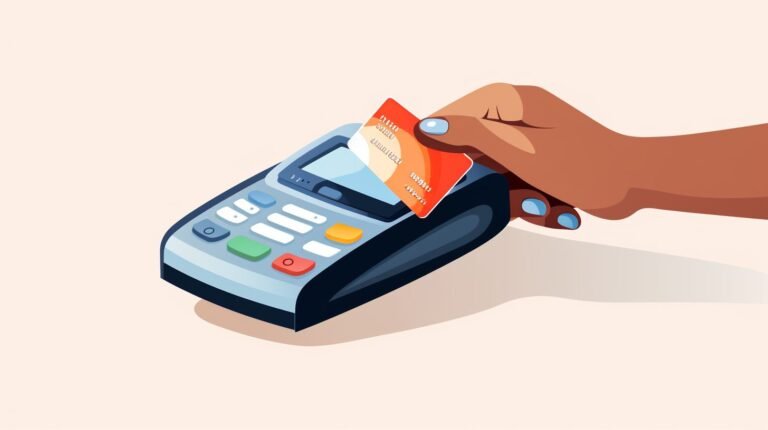Joint Accounts: How They Impact Your Credit

Key Takeaways
- Joint accounts create a financial association between account holders and can impact each other’s credit scores.
- Shared finances, such as joint loans or mortgages, mean that if one person misses payments or has bad money habits, it can harm the other person’s credit score too.
- Being an additional credit card holder does not create a financial association, but lenders may still consider the primary cardholder’s credit report when making lending decisions.
- It is important to communicate openly with other account holders about financial responsibilities and expectations to effectively manage joint accounts and credit scores.
Understanding Joint Accounts
A joint account is a type of financial arrangement where two or more individuals share ownership and responsibility for the account. It can be beneficial for shared expenses, but there are also potential drawbacks to consider.Definition of a joint account
A joint account is a type of bank account that two or more people share. They all can put in money and take it out. When they apply for things like loans, credit cards, or mortgages together, they form this kind of account. Shared bills at home like heat and water can also make a joint account. Their names are tied together on the accounts until credit agencies are told to change it. If one person skips paying their share, the others’ credit scores may drop too.Pros and cons of a joint account
Joint accounts, like many financial tools, are not a one-size-fits-all solution. They offer a range of benefits but also carry some potential pitfalls. It’s crucial to understand the pros and cons of a joint account before deciding if this is the right strategy for you.| Pros | Cons |
|---|---|
| Joint accounts allow for shared financial responsibilities, making it easier to manage joint expenses such as rent, utilities or groceries. | A joint account creates a financial association between the account holders. This means your credit rating could be impacted by the other person’s financial behavior. |
| It can help foster transparency in a relationship, as both parties can see where the money is going. | If one person overspends or mismanages the account, it can lead to tension or disagreements. |
| Joint accounts make it easier to save for shared goals, such as a vacation or home purchase. | All account holders are liable for any debts on the account, which could be problematic if someone fails to contribute their share. |
| In the case of an unexpected event, such as the death of one account holder, the remaining holder will still have access to the account. | Exiting a joint account can be tricky if the relationship between account holders breaks down. You’ll need to reach an agreement on how to divide the funds. |
Joint Accounts and Your Credit Score
 Shared finances can have a significant impact on your credit rating, and it’s crucial to understand how joint accounts play into this equation. Having a joint account means that both parties are equally responsible for managing the account and making payments. However, it’s important to note that joint accounts function differently from traditional credit accounts in terms of their effect on your credit score.
Shared finances can have a significant impact on your credit rating, and it’s crucial to understand how joint accounts play into this equation. Having a joint account means that both parties are equally responsible for managing the account and making payments. However, it’s important to note that joint accounts function differently from traditional credit accounts in terms of their effect on your credit score.How shared finances affect your credit rating
Shared finances can impact your credit rating in several ways. If you have a joint bank account, loan, or mortgage with someone else, this creates what’s called a financial association between the two of you. This means that both of your credit histories get linked together on credit reports. If one person misses payments or has bad money habits, it harms the other person’s score too. For example, if you and a friend share an apartment and are both named on the lease agreement, not paying rent on time will hurt both scores. Similarly with joint loans – if one fails to pay their part on time; all parties’ scores will go down. It is also vital to know that lenders may check out the other person’s report when they decide about giving loans! It might affect whether you get approved for future credits like mortgages and cards.The difference between a traditional and joint credit account
A regular credit account is all yours. You sign up for it and you run it alone. Your name is the only one that shows on your bills, loans, or mortgages. It also means you are the only one to blame if things go wrong. This can hurt your credit score. In a joint account, it’s different. Two people share this kind of account at the same time. Both names show up on money stuff like shared bank accounts and home loans. But be careful! If things go south, both scores get hit hard too. If you fail to pay back money in a joint loan or mortgage, your partner is also on the line! They must pick up where you left off with repayments. Both cases have good points and bad points so think about them before choosing the right path for managing money wisely.Financial Associations Created by Joint Accounts
When you open a joint bank account or become an additional credit card holder, it can create a financial association with the primary account holder.Does a joint bank account create a financial association?
Having a joint bank account with someone does create a financial association between the account holders. This means that your financial activities, such as overdrafts or missed payments, can impact each other’s credit ratings. It’s important to be aware of this when considering opening a joint bank account and to communicate openly about how it will be managed to avoid any negative consequences on your individual credit scores. Remember, financial links stay on credit reports until credit reference agencies are notified that they no longer apply.Does being an additional credit card holder create a financial association?
Being an additional credit card holder does not create a financial association. Financial associations are created when individuals apply for joint financial products like bank accounts, mortgages, or loans. However, it’s important to note that lenders may consider the other person’s credit report in a financial association when making lending decisions. So while being an additional credit card holder doesn’t create a direct association, it can indirectly impact your ability to get credit if the primary cardholder has poor credit.Myths about financial associations
There are some myths surrounding financial associations that need to be clarified. One common myth is that simply living with someone or being related automatically creates a financial association. However, financial associations are only formed when individuals apply for joint financial products like bank accounts, mortgages, or loans. Another misconception is that being an additional credit card holder on someone else’s account creates a financial association. In reality, the primary cardholder is responsible for all debts incurred by secondary users. Lastly, there may be a belief that having joint names on credit agreements or household bills will not affect your credit rating if you don’t make payments.Managing Joint Accounts and Credit Scores
 To effectively manage your joint accounts and credit scores, it is important to communicate openly with the other account holders about financial responsibilities and expectations. Regularly review your credit reports and scores to identify any discrepancies or errors that may be impacting your credit. Make sure all bills are paid on time and in full, as late or missed payments can negatively affect both your credit score and the relationship with the other account holders. Consider setting up automatic payments or reminders to help you stay organized. Additionally, work together to develop a budget and financial plan that aligns with everyone’s goals and priorities. By actively managing your joint accounts, you can maintain a healthy credit profile while maintaining transparency and trust within your relationships.
To effectively manage your joint accounts and credit scores, it is important to communicate openly with the other account holders about financial responsibilities and expectations. Regularly review your credit reports and scores to identify any discrepancies or errors that may be impacting your credit. Make sure all bills are paid on time and in full, as late or missed payments can negatively affect both your credit score and the relationship with the other account holders. Consider setting up automatic payments or reminders to help you stay organized. Additionally, work together to develop a budget and financial plan that aligns with everyone’s goals and priorities. By actively managing your joint accounts, you can maintain a healthy credit profile while maintaining transparency and trust within your relationships.How to manage your joint credit score
Managing your joint credit score is important for maintaining a healthy financial relationship. Here are some tips to help you manage it effectively:- Communicate openly: Regularly discuss your financial goals and responsibilities with the other account holder(s). This will help ensure everyone is on the same page and avoids any misunderstandings.
- Pay bills on time: Make sure all joint bills, such as rent or utilities, are paid on time. Late payments can negatively impact both of your credit scores.
- Monitor your credit reports: Keep an eye on your credit reports from all three major credit bureaus (Experian, Equifax, and TransUnion) to identify any errors or potential issues early on.
- Avoid excessive debt: Work together to create a budget and avoid taking on more debt than you can handle. High levels of debt can lower your credit score and put strain on your relationship.
- Maintain individual credit accounts: It’s important for each person to have their own individual credit accounts as well, in addition to joint accounts. This helps build and maintain individual credit histories.
- Regularly review joint account activity: Take the time to review statements and transactions for joint accounts together. This ensures accuracy and allows you to address any unauthorized charges or discrepancies promptly.
Tips on handling disagreements with other account holders
Handling disagreements with other account holders can be challenging, but it’s important to find a resolution that works for both parties. Here are some tips to help navigate these situations:- Communicate openly and honestly: Share your concerns and listen to the other person’s perspective. Effective communication is key in finding common ground.
- Set boundaries and expectations: Clearly define what is acceptable and what isn’t when it comes to spending habits, bill payments, and financial decisions.
- Create a joint budget: Develop a budget together that outlines how money will be spent, saved, and allocated. This can help prevent disputes regarding financial priorities.
- Seek professional advice if needed: If disagreements become persistent or escalate, consider seeking the help of a financial advisor or mediator who can provide impartial guidance.
- Keep emotions separate from finances: Try not to let personal feelings interfere with financial discussions. Stay focused on finding practical solutions that work for both parties.
- Consider compromise: Be willing to meet halfway and make compromises where necessary. Finding middle ground can help maintain harmony in managing joint accounts.
- Regularly review and assess finances: Schedule regular check-ins to review the state of your joint accounts and address any concerns or issues proactively.
Alternatives to Joint Credit Card Accounts
If you’re looking for alternatives to joint credit card accounts, there are a couple of options available. One option is to add an authorized user to your existing credit card account. This allows the authorized user to have their own card and make purchases, but they are not financially responsible for any debt on the account. The primary cardholder remains liable for all debts. Another alternative is to consider separate individual credit cards instead of a joint account. Each person can have their own credit card and be solely responsible for their own debt. This can provide more financial independence and personal responsibility. It’s important to note that some issuers may offer different levels of access or privileges for authorized users on shared credit cards. This means you can set limitations or restrictions on spending if necessary. Overall, exploring these alternatives can help couples or partners manage their finances in a way that aligns with their individual goals and preferences while avoiding potential risks associated with joint accounts.In Case of Issues: Protecting Yourself and Removing Financial Associations
 Learn how to protect yourself and remove financial associations from your credit report. Discover the steps you can take to safeguard against financial abuse and find out how to eliminate any unwanted connections. Don’t miss this important information on managing joint accounts and preserving your financial independence.
Learn how to protect yourself and remove financial associations from your credit report. Discover the steps you can take to safeguard against financial abuse and find out how to eliminate any unwanted connections. Don’t miss this important information on managing joint accounts and preserving your financial independence.How to remove a financial association from your credit report
To remove a financial association from your credit report, follow these steps:- Contact the credit reference agency: Get in touch with the credit reference agency (such as Experian, Equifax, or Credit Karma) that holds your credit file.
- Request a notice of disassociation: Ask the credit reference agency to add a notice of disassociation to your credit report. This will inform potential lenders that you are no longer financially linked to the individual in question.
- Provide evidence: Be prepared to provide evidence that supports your request for disassociation. This can include documents such as bank statements, loan agreements, or proof of address.
- Correct any errors: If there are any errors on your credit report related to the financial association, request that they be corrected by the credit reference agency.
- Monitor your credit report: Keep an eye on your credit report regularly to ensure that the financial association has been removed and that there are no other errors or discrepancies.
Protecting yourself against financial abuse
Financial abuse can have serious consequences for your credit and overall financial well-being. Here are some steps you can take to protect yourself:- Stay informed about your finances: Keep track of your bank accounts, credit cards, and other financial accounts regularly. Review statements and transactions carefully to identify any suspicious activity.
- Set up alerts: Many banks and credit card providers offer notifications for unusual account activity or large transactions. Take advantage of these alerts to detect potential financial abuse early.
- Protect your personal information: Be cautious about sharing sensitive information such as bank account numbers, social security numbers, or passwords with anyone unless absolutely necessary. Safeguard important documents like your ID, passport, and financial statements.
- Monitor your credit report: Regularly check your credit report from all three major credit bureaus (Equifax, Experian, TransUnion) for any unauthorized accounts or inquiries. Dispute any errors or fraudulent entries promptly.
- Consider freezing your credit: If you suspect financial abuse or identity theft, you may want to place a freeze on your credit reports. This prevents new creditors from accessing your credit history without your consent.
- Seek legal advice if necessary: If you believe you are a victim of financial abuse, consult with an attorney who specializes in this area. They can guide you through the legal steps needed to protect yourself and recover any losses.
What Are the Credit Implications of Opening a Joint Account?
Opening a joint account may have credit implications, particularly when co-signing a loan. Both account holders become equally responsible for the debt, creating a shared credit history. If one party defaults, it negatively affects the other’s credit score too. It’s crucial to consider the potential credit implications of co-signing a loan before committing to a joint account.
Conclusion
 In conclusion, joint accounts have a significant impact on your credit. They create financial associations and can affect your credit score if payments are missed or debts accumulate. It’s important to carefully manage joint accounts and communicate openly about finances to avoid negative consequences. Consider the pros and cons before opening a joint account and make sure both parties are committed to responsible money management.
In conclusion, joint accounts have a significant impact on your credit. They create financial associations and can affect your credit score if payments are missed or debts accumulate. It’s important to carefully manage joint accounts and communicate openly about finances to avoid negative consequences. Consider the pros and cons before opening a joint account and make sure both parties are committed to responsible money management.





